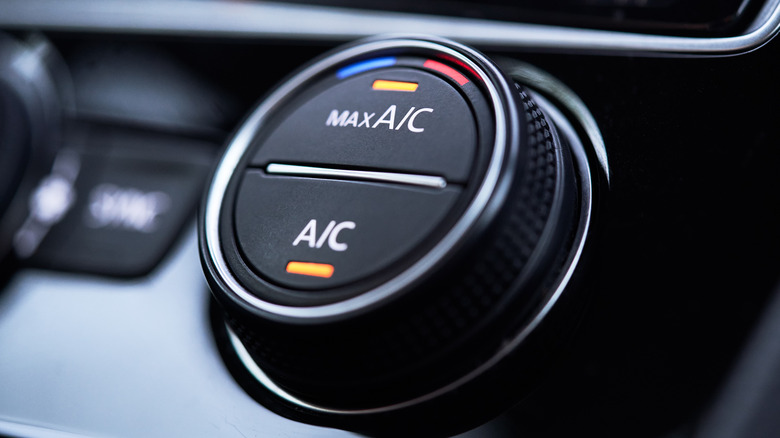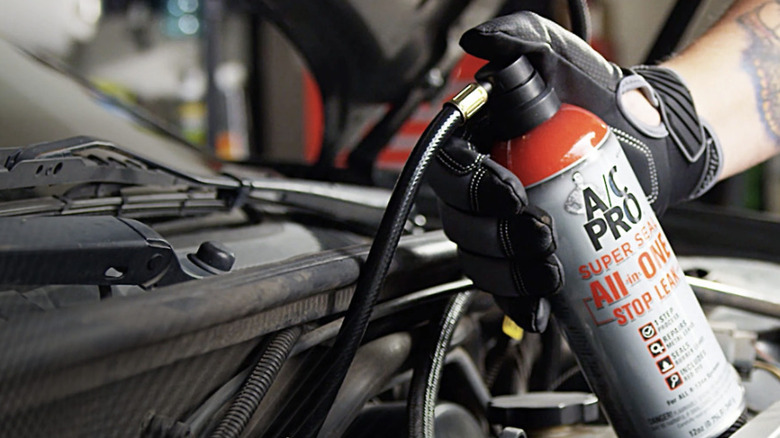
As the summer continues along, it has proven quite a scorcher for many. Home air conditioning setups are being pushed to their limits, and getting into a car after it sits in the sun for a while is a miserable,
sweltering experience. This is where a car's A/C becomes your best friend, pushing out all that hot, stuffy air -- a process that can be aided by a science-based trick that cools a car without immediate A/C -- in favor of the cool stuff. To keep it running at its best and pumping refreshing air into the cabin, an A/C refresh may be in order. This is an easy maintenance task, but if you're not careful, it can have major consequences.
An A/C recharge is pretty simple. Turn on the A/C, remove the low-pressure cap, pop the can with the refrigerant gauge on, and fill it up. However, depending on what's in said can, you could be in trouble. Some recharge kits come with stop-leak additives according to their label, which sound great in theory. As it turns out, though, they can actually damage your A/C system in time, gumming up elements like the A/C lines and compressor.
@royaltyautoservice Waste of money! #diy #mechanic #automotive #viral #fyp #foryou #cartok #tips #stitch
♬ original sound - Royaltyautoservice
TikTok user @royaltyautoservice pointed this out in a video on the matter, adding that if you use such refrigerant on your car, chances are mechanics will refuse to work on your A/C system afterward. It could damage their machinery, so they won't take the risk. Evidently, stop-leak refrigerant formula isn't ideal. With that said, some might find it worth using here and there.
Read more: 10 Used Cars You Can Safely Buy With Over 100,000 Miles
Some Might Find Stop-Leak Additives To Be Worth The Risk

If you need to recharge your A/C, you're not out of luck. There are refrigerant mixes out there that don't contain any stop-leak additives, so these should be safe. If all you have on hand are those with stop-leak elements, and you have a newer or expensive car, you definitely shouldn't use them. With that said, some drivers might want to give this remedy a try, especially if they know there's some kind of leak in their A/C system. After all, for a minor leak or two, stop-leak formula refrigerant could theoretically be a lasting solution, with a best-case scenario seeing it add years to your A/C system without trouble arising.
Given the risks associated with stop-leak refrigerant, though, you don't want to use it in a car with a long life ahead of it. Rather, if your car isn't long for this world, or you simply don't plan on ever having the A/C system serviced by a professional who might turn you away, it can be a fine temporary fix. Just know that, at the end of the day, if your A/C system has a leak, eventually it will likely need a more extensive repair than just adding some stop-leak chemicals.
That's why instead of running the risk of stop-leak refrigerant making the issue worse, perhaps paying whatever it costs to have an A/C recharge done by a professional is the way to go. All in all, stop-leak refrigerant may sound like a good idea, but it's not the way to go for everyone. Next time you need to recharge your A/C, take a good look at the can so you know what you're getting yourself into.
Want the latest in tech and auto trends? Subscribe to our free newsletter for the latest headlines, expert guides, and how-to tips, one email at a time.
Read the original article on SlashGear.












